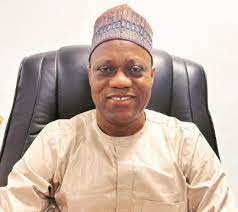…..Reaffirms Credibility Of Latest Unemployment Rate, Other Data
The Statistician-General of the Federation and Chief Executive Officer of the National Bureau of Statistics (NBS), Prince Adeyemi Adeniran, has called on all stakeholders in Nigeria’s statistical system to support the ongoing Consumer Price Index (CPI) and the Gross Domestic Product (GDP) exercises now being revised to ensure robustness and credibility of the results.
Adeniran, who gave the charged on Thursday at the Sensitization Workshop organized by the Bureau in Abuja, noted that though the statistical agency was committed to ensuring the credibility of the exercises’ data in line with its current reforms initiatives, the stakeholders’ inputs would help to broaden the scope of the exercises and enable the Bureau to consider their advice and suggestions in the rebasing exercises.
While thanking the development partners, Ministries, Departments and Agencies (MDAs), the academia and professional bodies for their continued support for the Bureau’s activities, particularly on surveys and the ongoing CPI and GDP, rebasing exercise, the Statistician General assured the stakeholders that NBS’ management would continue to value their unbiased advice and suggestions in its sustained drive to standardize the Nigerian statistical system in line with global best practices.
The chief statistician of the federation, who based his remarks mostly on some questions raised by experts at the workshop, said that contrary to some erroneous insinuations in some section of the public that the government was influencing the results of the data being produced by the Bureau for political interest, the surveys and data being produced by the NBS were usually sourced without any political or external interference of any sort.
Adeniran clarified: “Let me use this occasion to, once again, confirm to Nigerians that there is no political interference with all our data collation and production processes at any level. On the latest Unemployment and Underemployment report published by the Bureau on which some people feel it is not reflective of the realities of the economy, what we did was to use the ILO methodology in conducting the survey and what we reported and processes used aligned with international best practices just like our other published statistical data on the economy.”
According to him, the NBS has been working with state statistical offices in the country with a view to ensuring a fully integrated national statistical system and that the ongoing CPI and GDP rebasing exercises will be conducted with supports from sub-national governments through the National Consultative Committee on Statistics (NCCS).
The NBS’ CEO promised the stakeholders that their suggestions during the workshop, including the need for the Bureau to use real-time pricing in computing the about to-be-rebased CPI, adoption of technology, weight and number of the items to be used for the CPI rebasing, and basing the GDP on revenue ratio against the debt ratio, would be considered in the ongoing exercises.
On the benefits of the GDP rebasing to the economy, Adeniran said that the rebasing of the GDP would help in improving the timeliness and credibility of Nigeria’s statistical data for national planning and sustainable development.
Earlier in his presentation, the Head, Prices Statistics Division of the NBS, Dr. Ayo Anthony, spoke on the imperativeness of the CPI rebasing exercise, saying that the exercise is justified to correctly determine items weight changes over time; including of new items in the CPI basket; because of consumption pattern changes over time.
Other reasons he used to rationalize the current CPI rebasing exercise include to ensure that the price reference period is not more than five years compared to the current period; the need to generate CPI the monetary authorities can use for efficient monetary policy formulation; and comparability of Nigeria’s CPI with other countries’ globally.
Similarly, the Head of National Accounts Division of the Bureau, Dr. Baba Madu, explained that the rebasing was important to reflect the recent structure of the economic changes in terms of production and consumption patterns, alteration in the variety of products and services due to technological innovations and developments; and to incorporate those economic activities that were not in existence in the old base year or were not being adequately captured in the GDP compilation framework.
Madu said that the successful completion of the exercise would enable policymakers, analysts, investors and other economic stakeholders to obtain a more accurate picture and a better understanding of the nation’s economic structure, and inform policy decisions and design of programmes for Nigeria’s development.






